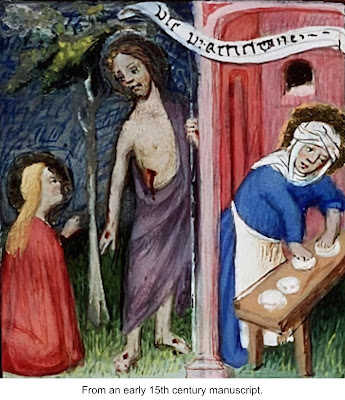Today we commemorate those particular friends of Jesus during His earthly life, Saints Martha, Mary, and Lazarus. For this day, I want to post a selection from Spiritual Exercises of the Fraternity of Communion and Liberation in 2022, preached by the Abbot General of the Cistercians—Abbot Mauro-Giuseppe Lepori. That weekend in April-May 2022—which I was able to participate in from my bedroom thanks to live-streaming internet technology—was an extended meditation on today’s Gospel reading from the 10th chapter of Luke. Here we see, amidst the ordinary circumstances of domestic life, the radical origin of Saint Martha’s vocation to recognize in Jesus “the one thing necessary”—the One who enters into our lives of anxiousness and worry and reminds us that He is with us, that He wants to be with us.
This is true for each one of us, for every human person. Jesus’s words to Martha remind us of the reason why we exist, what we are made for, what gives meaning and value to every moment of life.
The selection from the Conference preached by Father Mauro-Giuseppe on Saturday morning, April 30, 2022 follows below in bold type:
“Martha, Martha, you are anxious and worried about many things. There is need of only one thing” (Luke 10:41-42).
Jesus repeated her name twice. What attention He showed her! What esteem! It is precisely like when God called Abraham to ask him to sacrifice Isaac (Genesis 22:1), or when He called Moses from the burning bush (Exodus 3:4); that is, in the crucial moments of salvation history. Or it is like when Christ called Saul of Tarsus, who was wholly intent on his mad mission of persecution: "Saul, Saul, why are you persecuting me?" (Acts 9:4)
Martha also found herself in front of the God who seizes you in the place where you think you possess your life and asks you to have a preference for Him. In that moment Abraham was sure he possessed his posterity forever. Moses encountered God in the burning bush, and Saul was sure that he was doing what was right and true, the rightest and truest thing a man can do. Right there, where you think you possess your own life, right there, God asks you to have a preference for Him.
Actually, He not so much asks you as proposes it to you. And immediately there is a mysterious attraction in God's proposal of Himself as the all of your life, as the life of your life. For this reason, Abraham even obeyed the proposal to sacrifice his son; Moses removed his sandals and approached the burning bush; Saul let himself be led like a baby and entrusted himself to the small Christian community of Damascus he had wanted to destroy.
For Martha it was the same call, brought down into her daily existence, but it was the same call. What difference of value can there be between the call of Abraham or Moses and that of this woman harried and busy in the kitchen, if the call comes from the same Lord and God? Actually, I would say that Martha's call was even more extraordinary, because the Eternal One did not call from heaven or a burning bush, or from Mount Sinai, but He was there, sitting in her house, there, speaking, a man like us who arrived tired and sweaty with dusty feet, and who then sat down to eat and drink like us. This is more extraordinary than the burning bush, more extraordinary than Mount Sinai smoking and trembling and causing the people to tremble.
As Jesus said of John the Baptist: “Amen, I say to you, among those born of women there has been none greater than John the Baptist; yet the least in the kingdom of heaven is greater than he” (Matthew 11:11). We are greater because the proposal God makes us in His incarnate Son is more extraordinary. The way God offers this proposal in the incarnate Son, and thus in the flesh, in the daily life of our human existence, is more extraordinary.
Martha’s kitchen, like the Virgin Mary’s little room or cave in Nazareth before it, were even more sacred places than the oaks of Mamre for Abraham, than Sinai for Moses, than Oreb for Elijah, because God had never been so present as He was in Jesus Christ. “And the Word became flesh and made His dwelling among us” (John 1:14); literally, came to “pitch His tent,” to place His tent in our midst, to set up His tent in our midst, to encounter us up close, familiarly, within our life, and in this way with disarming simplicity to offer us in Himself everything for which the human heart is made, of which the heart of every human being in human history is made.
When someone is surprised by this, by this event, like Martha that evening at the words of Jesus, what happens? What should be done? What reaction is asked of the freedom provoked and attracted by such a proposal of fullness made by God? For Martha, a journey, a following began. The Eternal One revealed to her that He is everything, not only in Himself (even the pagans knew this!) but for her, precisely for her “Martha, Martha!”—just as for Mary and Lazarus, as for Peter and the other apostles. Jesus was everything specifically for her!
But when Christ reveals Himself to us as the only One necessary, as the only One we need, this first of all asks a decision of us, because if it is true that I need only Him, then I can no longer separate myself from Him.
